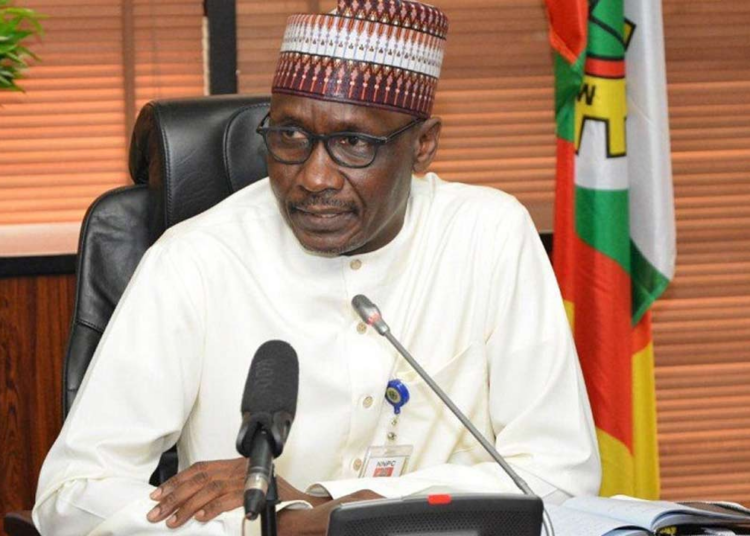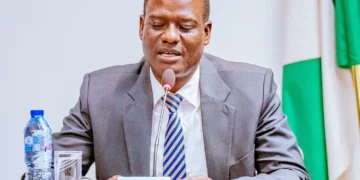The group chief executive officer of the Nigerian National Petroleum Company Ltd, Mele Kolo Kyari, has said that it is not blocking deals by International Oil Companies (IOCs) contrary to speculations in the oil and gas sector.
This is as secretary general of the Organisation of Petroleum Exporting Countries (OPEC), Haitham Ghais has said that the organization would require the full support and cooperation of President Bola Tinubu to assist Nigeria in meeting it’s energy needs.
Speaking at the event, 2023 NOG Energy Week in Abuja, yesterday, Kyari said the NNPC is not blocking any deal even with competitors, as he challenged operators on how much of the aspirations of the 2012 divestment have been met.
The 22nd edition of the NOG Energy conference has the theme, “Powering Nigeria’s Sustainable Energy Future”
Recall that NNPCL had last year secured an injunction from an Abuja high court restraining the sale of shares of ExxonMobil Nigerian units to any third party.
Kyari, however said yesterday the company had no hand in scuttling divestment plans of multinational oil companies.
He said rather than blocking deals, the NNPC is now the competition and the Petroleum Industry Act has better placed the National Oil Company on a solid ground to even divest some of its holdings.
He urged players in the oil and gas industry to be on the look out because the NNPC will be putting some of its assets for sale
He said, “New players are coming in and I share the sentiment.But sentiment don’t close deals, it is engagement that are clearly targeted at closing deals. For some of them so that we don’t go with speculation, NNPC is not blocking any deal. We are the competition yes.
“On the Shell divestment, we are supporting them to resolve it. We want to see more private-sector companies walk in. There are assets we will not come in. We will not walk in; we will not participate as a matter of very functional, considered, business decision.
“So just get ready, you will see assets. We are not going to stop you from getting from anyone else, you will get from us and be ready for it.
“Secondly, we have to work together to see how we can build our gas infrastructure. We will lead as a business not support because we know we will make money from it. We are saving the numbers and we will complete our project.”
Kyari also said that the National Oil Company will issue its Initial Public Offer to investors very soon.
The NNPC boss said as a Company that is guided under the regulations of the Companies and Allied Matters Act, the NNPC will declare its shares to the public for acquisition very soon.
He said, “I’m happy to say this moment that this country is changing. And by the way, I can tell you we are the competition. We are NNPCL. We don’t create rules anymore. We are the competition.
“We will pay taxes; we will pay royalties like anyone; we will also pay dividends to our shareholders which many of you are. So we are in business and business means competition. We are a private sector – forget about the fact that we are own by the government 100 per cent.
“By the way, you are also aware, we are going Initial Public Offer (IPO) very soon, we’ll sell a part of our equity. It’s in the law, and once that happens, we will not be any different for any of you and it will be a very different business environment.”
The NNPC GCEO stated further that affordability, accessibility and sustainability are the drivers of Nigeria’s energy future.
Kyari noted that key initiatives on the horizon for NNPCL will include expanding gas infrastructure to deliver gas across West Africa and potentially, Europe; expansion of liquefaction capacity of NLNG and enabling availability of LPG as a cooking fuel and CNG as alternative fuel for automobiles.
Reaffirming Nigeria’s status as a gas nation with associated oil, Kyari reiterated the need to bridge the skilled manpower gap, ensure asset security, and invest in infrastructure to transform challenges into opportunities.
The GCEO also added that strategic decisions like subsidy removal have already paved the way for positive change in the sector, while freeing up capital for powering the sustainable supply of energy.
“N400billion monthly for subsidy was another malaise. We are already seeing the value. No more free dollars”, he said.
According to him, the removal of petrol subsidy as well as the collapse of multiple foreign exchange regime has provided a level playing field for all operators as they all have to get dollars at the same rate.
He said, “Are we positioned to facilitate business? Yes, but our partnership produced over 80 percent of the oil and gas in the country – either directly or through our off stream company – or through our partnership
“I’m in a position to facilitate business. On the PSC today, we are just agents of the state, trying to make sure we deliver value to them and then they will pay…
“I’m sure you appreciate this new relationship. The PSCs are not on the balance sheet on the NNPCL. We Make sure you do your work because when you do, we are compensated 40 per cent of your profit oil, so it’s important for us as well as business for us.”
On the issue of energy poverty, he said the focus now is to ensure that more people have access to energy.
Kyari added, “Over 30 per cent don’t have access to electricity. So, is energy available or is it the problem of affordability or it is that we have an unsustainable situation or is it combination of all of them? I think we are dealing with the combination of all.
“Energy is not available, it is not affordable in definite sense because of the many structures,
many issues that have made affordability a matter of concern for everybody not just the consumer but because we can’t even afford financing for it.
“Nobody is going to give you money for projects you are not going to get back your money. Today NNPC is exposed to all of you now, not just the government.
“We supply gas, we don’t get payment we don’t get payment for it; We supply power and we don’t get payment it. So, you can’t run any business this way. You cannot be sustainable. You cannot create affordable energy and it will not be available.”
Speaking earlier, OPEC secretary general, Haitham Al Ghais said global demand for all forms of energy is forecast to rise by 23 per cent through 2045.
He said OPEC will continue to do its part in promoting a pro-investment environment for Nigeria
The OPEC boss stated further that despite the challenges that lie ahead for the oil and gas sector, Nigeria and other countries are presented with many opportunities.
He said, “The long standing relationship between OPEC and Nigeria runs deep. Our ties to shared values go all the way back to 1971 when Nigeria joined it contributions Nigeria has made this organization since that time are simply too many to list.
“And now, as we look ahead, OPEC will continue to rely on Nigeria’s crucial support and cooperation as His Excellency President Tinubu takes the country forward to help meet the needs of Nigerians now and in the future.”
Al Ghais also said calls to limit or stop funding new oil projects were unrealistic and unwise. He acknowledged, however, the need for technology to tackle continued fossil fuel emissions.
“Global primary energy demand is forecast to increase by a significant 23 per cent in the period up to 2045, which means we will need all forms of energy,” he said.
“We will require innovative solutions such as carbon capture utilisation and storage, and hydrogen projects in addition to a circular carbon economy, which has received a positive endorsement from the G20.”
The global oil industry needs $12.1 trillion in investment during the same period, Al Ghais said, adding the industry was not on track to reach that level of investment yet.
Sources close to OPEC have said it will likely maintain an upbeat view on oil demand growth for next year when it publishes its first outlook later this month, predicting a slowdown from this year but still an above-average increase.
OPEC’s forecast for 2024 will likely be lower than the growth it expects for this year of 2.35 million barrels per day, or 2.4%, an abnormally high rate as the world moves out of the COVID-19 pandemic.
On the transition from fossil fuel to renewable, Ghais said time has come to see a fair, inclusive and equitable approach to ensure that nobody is left behind as stakeholders navigate the energy transition journey.
He said the OPEC will continue to work closely with member countries to ensure that all voices are heard, and all circumstances are considered in any negotiations or discussions related to climate change.
“The oil and gas industry has a long history of being at the cutting edge of innovation and technology and now, it has the possibility of bringing that expertise to bear on developing cleaner and more efficient technological solutions to help unlock emissions free future.
“While there is great promise in many of these areas, there is also a grim reality shared by far too many around the world but unfortunately have no access to energy at all. According to the UN, for example, 73 million people do not have access to electricity.
“Furthermore, one-third of the world’s population use dangerous or inefficient complex system which causes a host of health related problems. This uneven world of energy haves and have nots would require that the capacities and national circumstances of developing countries be taken into account when considering actions related to climate change.
“Policymakers must be keenly aware that even the best of intentions can result in unintended consequences and if policies are not well thought out, we could end up making things worse with the potential for high volatility, energy shortfalls or other unwanted outcomes “
On investments inflow into the oil and gas sector, he said the global oil sector alone would need a massive cumulative investment of $12.1trn between now and 2045.
Ghais added, “We are currently not on track to reaching that level. To make things worse, we have in recent years given her calls to limit or stop funding new oil and gas projects all together.
“This is of course, unwise and is a very realistic scenario that will be particularly devastating to developing countries who rely on revenue and their precious oil and gas resources to develop their economies.
“Africa for example, is blessed with an estimated 120 million barrels of crude oil reserves and 18 trillion stand meters of natural gas.
“However, a significant investment will be required to fully realize the potential of these resources to benefit African citizens, while also enabling necessary mitigation actions needed to reduce the carbon footprint of the oil industry.
“In some cases, financial institutions are limiting and tightening, controlling how money is invested into fossil fuels under Environmental, Social and Governance (ESG) impacts this situation is hindering Africa’s progress despite the fact that Africa accounts for only 3 per cent of global greenhouse gas emissions.”





